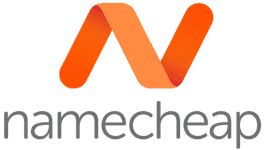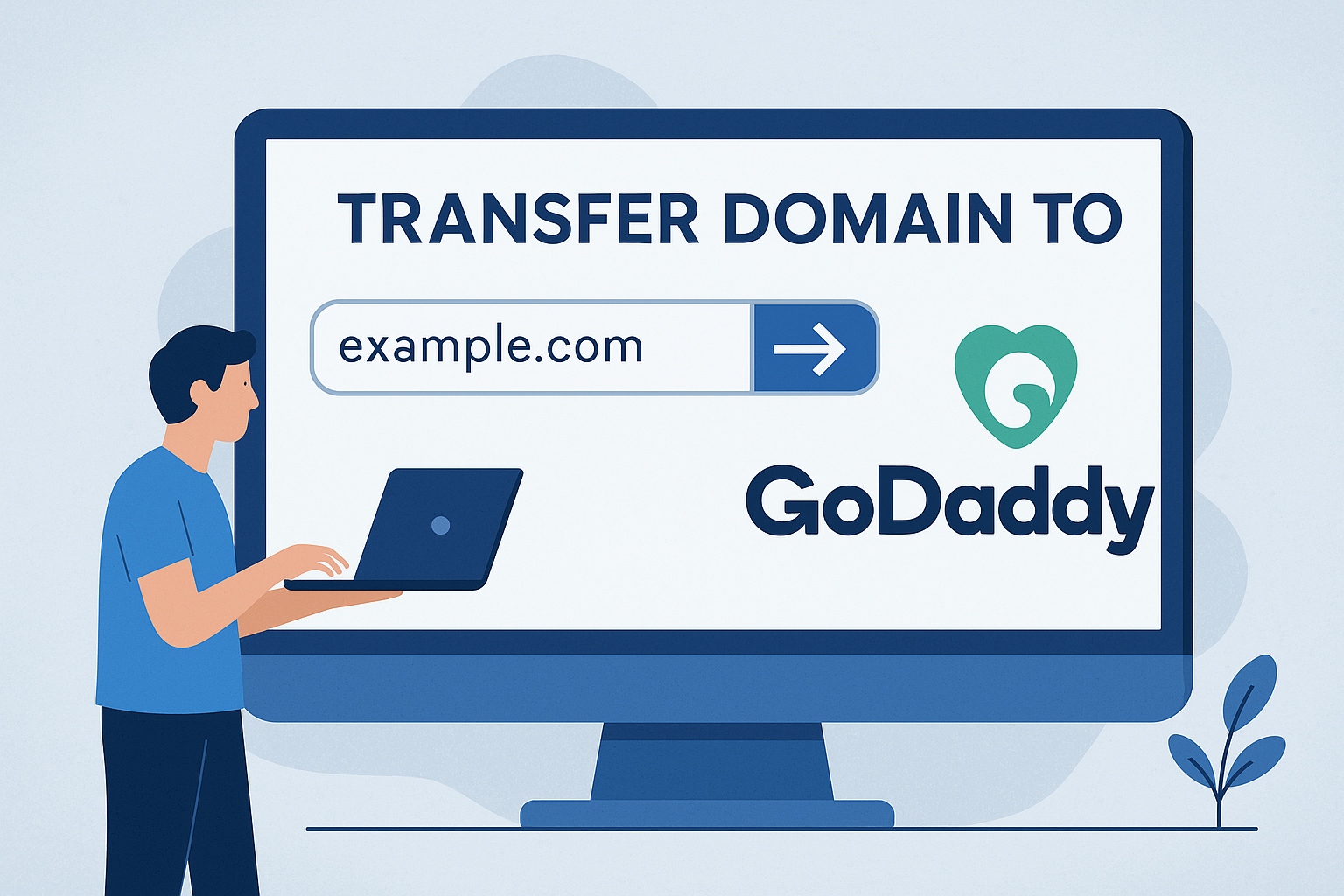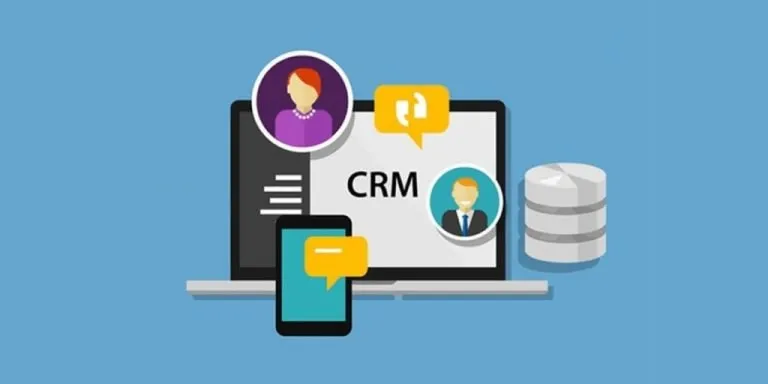Advertising disclosure
Hosting Canada is community-supported. We may earn a commission when you make a purchase through one of our links. Read Disclosure.
Namecheap Review 2026
We’ve been testing Namecheap for several months now and believe we can give an honest, detailed review about the service and how its tools compare to other options out there that are similar.
Who is Namecheap and What are they About?
- Free Domain and Migration
- Money-Back Guarantee
- Fully-Loaded Value Plan
- Positive Third-Party Reviews
- Unclear Upselling
- Less Than Stellar Customer Support
- Free Privacy Protection
- Unmetered Bandwidth
- Regular Backups
- Multiple MySQL Databases
- Free SSL Certificate for the First Year
First, a bit about what Namecheap is and what it does.
Namecheap began in 2000 and in its two decades in business, has accumulated millions of customers. Namecheap is a web hosting and domain registrar company and has more than seven million domain names and users under its control.
Here’s where Namecheap seems to differ from some of the other companies out there. There are plenty of hosting companies that are known for doing such and such, and they use that well-known branding and financial muscle into doing an additional service.
If you decide to get your domain name from Namecheap, make sure to also check our EasyWP review which is their WordPress hosting service.
It turns out, though, that they aren’t good at that new service and might not even be great at their original service offerings—they just have a well-known name in the industry.
How Is Namecheap Different?
Ideally, Namecheap would be able to take the success they had with what they were doing with domain names.
And carry that over into other areas, such as hosting and registering a domain should be a breeze.
We tried to find out.
Through domain name registration, we purchased their cheapest hosting plan and created a test website to see how it performed.
Our metrics were based on uptime and speed. We’ll describe what we learned in-depth, but we’ll start by what we think is best about Namecheap’s hosting ability.
Namecheap Hosting Pros
Namecheap offers a variety of features, including:
Free Domain and Migration
This is their bread and butter offering. Namecheap does its best work when it comes to domain names.
This is one of the main reasons you get one free of charge when you sign up for hosting. And if you’ve already established a website elsewhere, Namecheap will help with the migration of that existing site free of charge.
Not to mention, Namecheap domains all come with free privacy protection, making it one of my favorite domain registrars overall.
Money-Back Guarantee
 Namecheap offers a 30-day money-back guarantee.
Namecheap offers a 30-day money-back guarantee.
This guarantee is no joke and you get an entire month to use the service and determine if it’s the best option for you or your business.
That means you get plenty of time to try it out and back out of the situation if you decide you’d rather go in a different direction.
This is good news and means you should try it out for yourself, regardless of what anyone else has had to say about it. After all, as long as you make your decision within the 30-day window, you have nothing to lose.
Fully-Loaded Value Plan
We have plenty of experience trying and reviewing web host plans. We know what’s out there and we know the ins and outs of what they offer.
In most cases, we’ve signed up for the most basic plan and used a test site, as we did here with Namecheap.
We do this because most plans offer essentially the same thing and we want to be sure we’re basing our analysis on similar circumstances. Essentially, we’re doing our best to make sure we’re comparing apples only to apples.
Despite using our typical evaluation criteria for Namecheap, we came away surprised by what we’d learned about the company. For starters, they offered unmetered bandwidth in their least expensive plan.
They also provide access to standard features including cPanel access and the WordPress app and others. With the least expensive plan, you also get a free SSL certificate for the entire first year. After that, you’ll pay, but that’s still a year you’re getting for free.
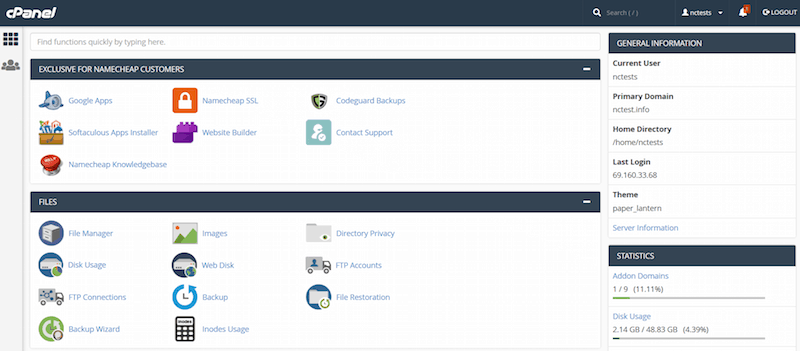
The plan also comes with backups that occur two times a week, which protects your site if an update doesn’t go as planned.
Finally, and what we think is very appealing about the basic plan offer, you get 50 MySQL databases. The majority of hosting companies offer you nothing even close to that in their basic plan.
You’re also able to set up three sites with the basic option. Most value plans offer you the ability to host just one single site. If you have more than one site, say a personal and a business site or multiple business sites, this option is unbeatable. There’s more.
You even get as many as 50 email addresses as soon as you sign up. This gives you the ability to run a business with a comprehensive website and provide employees with their own email addresses linked to the business site.
It’s a huge cost saving that you aren’t going to find with most hosting companies.
Third-Party Namecheap Reviews Are Outstanding
We’re not the only ones who have noticed that Namecheap is doing a great job.
Part of our evaluation process is finding out what others have to say about the hosting companies we’re evaluating. And in the case of Namecheap, most of what they are saying is really good. So much so, some of the positive reviews surprised us.
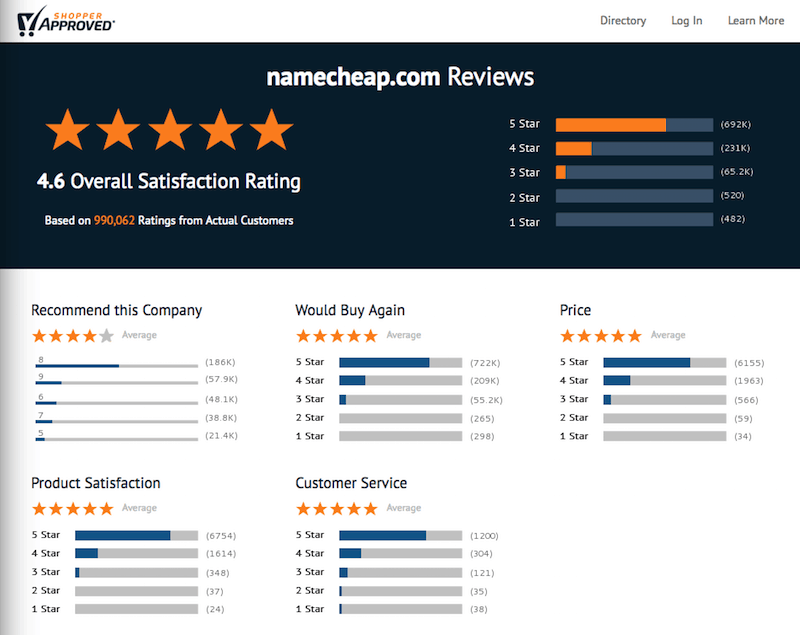
Namecheap has a 4.6-star rating on Shopper Reviewed, which is supposedly based on nearly one million reviews. Pair that strong rating with what we already knew about their base plan and we were getting excited about Namecheap.
It wasn’t until we put up our test site that we began to see some of the weaknesses of Namecheap.
Namecheap Hosting Cons
There are three things we consider when evaluating a web host. We base our overall assessment primarily on these three things, with a few other considerations thrown in that vary from company to company.
The three main categories are:
- Uptime: Is my site live most of the time?
- Speed: Do they offer a positive experience for site visitors so they are sure to want to return?
- Support: Do they help me if something goes wrong?
Namecheap didn’t deliver in any of these three areas.
We’ll give you a few examples:
Uptime was Poor
Initially, we experienced 100% uptime during that first trial month (remember the 30-day money-back guarantee?). Our hopes were high, but over the next few months, the uptime didn’t even measure up to the industry average.
Ultimately, our uptime was only around 99.876%, which is more than 60 minutes your site is down each month.
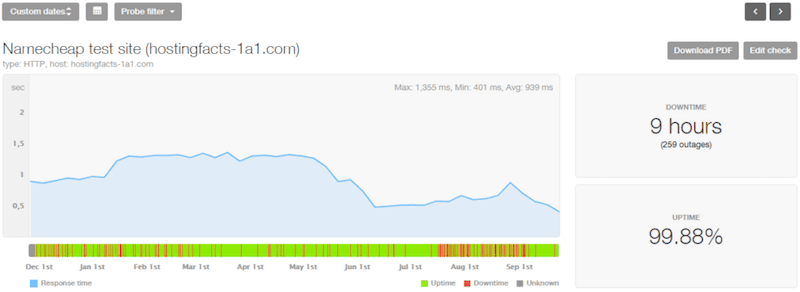
Even if you think you can handle an hour of downtime a month, it’s impossible to predict when it will occur. What if it’s during your busiest time of the year? What if it’s when your most important sale is about to take place?
There’s no way to schedule this unpredictable downtime, so you have to suffer through whenever it happens to occur. That’s not good and it means lost revenue for your company.
Here’s the specific breakdown of our month to month numbers over the course of 10 months. Read more about our 4-step research process here.
- December 2017 avg. uptime: 99.83%
- January 2018 avg. uptime: 99.85%
- February 2018 avg. uptime: 99.78%
- March 2018 avg. uptime: 99.94%
- April 2018 avg. uptime: 99.94%
- May 2018 avg. uptime: 99.94%
- June 2018 avg. uptime: 99.89%
- July 2018 avg. uptime: 99.84%
- August 2018 avg. uptime: 99.80%
- September 2018 avg. uptime: 99.95%
Load Time was Slow
Nobody wants to wait for a site to load and that statement becomes truer and truer with each passing year. People are impatient and it should be a primary goal of every hosting company to make load time as fast as possible.
We consider load time the second most important aspect when evaluating a hosting company, behind uptime.
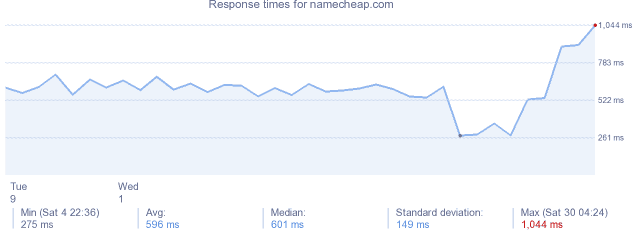
Site owners want to make visitors happy and unless they get the information they want fast, they won’t be happy. A few Google statistics that demonstrate the importance of load time and how fast load times create happy customers:
- Sites that take three seconds or less to load have an average bounce rate of 32%.
- When load time increases to five seconds, the bounce rate increases to 90%.
- Up to six seconds the bounce rate increases to 106%.
- And if visitors are waiting 10 seconds for a site to load, the bounce rate is 123%.
Bottom line? You’re chasing people away if your site is slow to load. Look at it this way: if your site is too slow to load, it might as well be bad because so many people will head elsewhere.
According to the data, Namecheap has speeds clocks in at an average of 942 milliseconds over the course of the last 10 months. This is twice as slow as HostGator Cloud and A2 Hosting.
Another thing we noticed: it wasn’t a single bad month pulling down the average. Namecheap was slow for us from the very first few days we were using it and just recently began to speed up a bit.
Here are our numbers for our test site over a 10-month period:
- December 2017 avg. speed: 905 milliseconds
- January 2018 avg. speed: 1,127 milliseconds
- February 2018 avg. speed: 1,297 milliseconds
- March 2018 avg. speed: 1,299 milliseconds
- April 2018 avg. speed: 1,303 milliseconds
- May 2018 avg. speed: 1,117 milliseconds
- June 2018 avg. speed: 590 milliseconds
- July 2018 avg. speed: 559 milliseconds
- August 2018 avg. speed: 662 milliseconds
- September 2018 avg. speed: 559 milliseconds
Less than Stellar Customer Support
Customer service is the final area where we evaluated Namecheap. What we found was that despite their strong FAQ platform that was actually quite helpful as hosting providers, there wasn’t much else there in the way of a support team.
Granted, most of the problems that would arise can be solved by the information provided in the FAQs. But we also like to know that live chat and other support is available if need be.
Live chat is an option with Namecheap. It connected quickly and the support representative was friendly. She was not able to help us, though, and had to transfer us to the concierge—seems helpful and friendly enough. It was not.
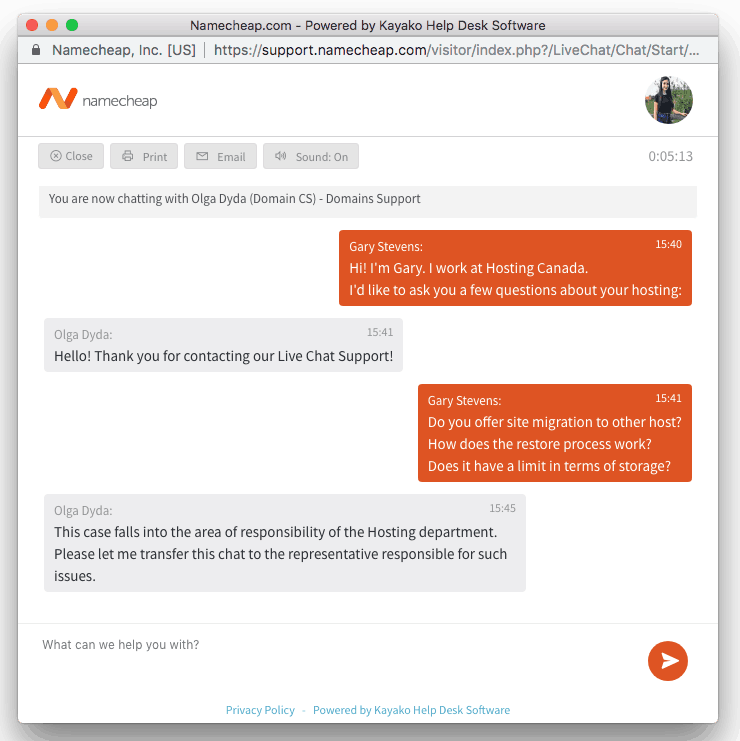
Basically, Namecheap’s concierge just cut and pasted an article of basic information into the chat box, which did not help at all.
We didn’t need someone to explain the process, but we did need them to perform the service.
Something the average hosting company is more than willing to do, even as part of their basic plan.
Essentially, we were given some additional information and told to do it ourselves.
Furthermore, once we were handed off from the original representative, the process slowed down. A lot. It took several minutes and all we walked away with was information we could have found on our own had we looked, which didn’t even offer a resolution.
This is bad news. If your website is down and you need help, you need it fast and you need to be able to put your faith in a customer service team that will fix the problem.
Namecheap Pricing, Hosting Plans, and Facts
Before we wrap up our Namecheap review, let’s take a look at the nuts-and-bolts information we have about Namecheap hosting.
Hosting plans include:
- Stellar: Unmetered bandwidth for up to three websites for $2.88 per month in the first year.
- Stellar Plus: Increased disk space to Unmetered, for $4.88 per month in the first year.
- Business SSD: SSD disk space of 50GB, which is enough for ten websites and all that comes with only $8.88 per month.
You get a free domain the first year and signing up is easy. They accept credit card payments, as well as PayPal, Bitcoin, and Dwolla.
As far as hidden fees, there aren’t any officially, but you need to keep in mind that the offers are only available for new hosting purchases only.
The price is good for 12 months when you pay annually and the rate will renew at the regular rate. Any upgrades or downgrades are done at full renewal price.
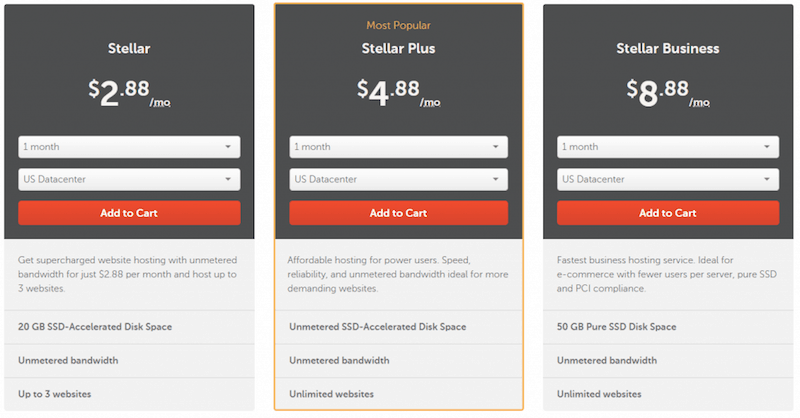
You’ll experience some upselling which isn’t overwhelming or annoying. Account activation is speedy and you’ll gain access to the control panel and dashboard, which is cPanel.
Finally, you’re able to install apps and CMSs, including ones from WordPress and Joomla, as well as others with their one-click installation tool that’s easy to install.
Namecheap Review Conclusion
The bottom line? We think our experience with Namecheap was positive initially, but we weren’t happy in the long run.
There are plenty of happy customers out there and there’s no denying all that comes with their basic plan.
Unfortunately, that great value goes away after the first year and your renewal rate will rise by more than 300%. No doubt, Namecheap is a fantastic place to buy a new domain name, but not that great if you’re looking to actually host your website.
Factor in the lack of uptime, the slow low speeds, and the lack of customer support, and it’s just not worth it.





